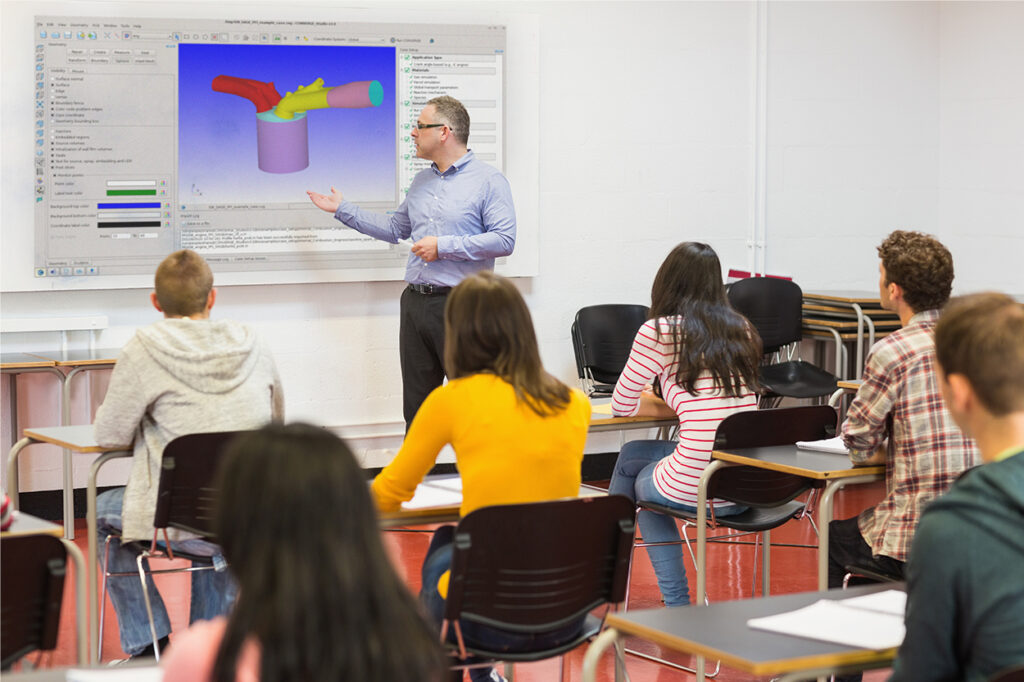
Empowering Academia
The CONVERGE Academic Program empowers students, professors, and academic researchers globally to contribute to the advancement of science and technology. We offer exclusive license deals (free in the United States and Europe) for our industry-leading computational fluid dynamics software, CONVERGE, for academic research. In addition, we provide free support, training, and resources for our academic users.
At Convergent Science, we strongly believe in the societal value of academic research and the importance of educating the next generation of engineers, entrepreneurs, and innovators. We work with colleges and universities around the globe to support researchers in a diverse set of fields: automotive (including electromobility), aerospace, biomedical, renewable energy, and more. Skilled engineers in these fields have leveraged CONVERGE’s unique capabilities to study emissions from internal combustion engines, biofuels, lean blow-off in gas turbines, rotating detonation engines, pathogenic spread, atmospheric air pollution, wind farm design, blood pumps, and even climate conditions in poultry houses.
The benefits of the CONVERGE Academic Program extend to professors, educators, academic institutions, and industry at large. Because CONVERGE’s autonomous meshing significantly reduces the time needed to set up and run simulations, students and academic researchers are more productive, producing more compelling results and making exciting scientific and technological advances. In addition, our exclusive license deals mean you get the benefits of CONVERGE, along with our complimentary training and support, while spending less money.

Ultimately, the goal of the CONVERGE Academic Program is to help produce experienced, competent engineers who go on to contribute to industry and society. With the training and support offered to participants in our program, students enter the workforce not only knowing how to run CONVERGE simulations, but also with a deep understanding of the physics behind the models and the knowledge and skills to drive innovation.
Supporting Students
There are many reasons for high school, undergraduate, and graduate students to participate in the CONVERGE Academic Program.
Jump-start your career. CONVERGE is widely used in industry, academia, and government. Your CONVERGE knowledge will be a powerful asset as you look for engineering jobs after graduation. While of course we hope you will continue to use CONVERGE beyond your academic experience, the skills and knowledge you gain working with our software, interacting with experienced CONVERGE support engineers, and through our free training are directly transferable to post-graduation engineering jobs.
Spend your time on what matters. Manually making meshes for CFD simulations can be an arduously long process, sometimes taking weeks or months. CONVERGE automatically generates an optimized Cartesian mesh at runtime, effectively eliminating all user meshing time. The result? You have more time to devote to research and analysis, and you can accomplish more in the same amount of time than you could with a different CFD solver.
Trust your results. CONVERGE’s state-of-the-art physical models have been validated for a wide array of conditions and applications. In addition, CONVERGE’s Adaptive Mesh Refinement automatically refines the grid at each simulation time-step, ensuring that you capture the important physical phenomena necessary for accurate, predictive simulation results.
Incorporate your own models. Are you developing or testing a novel physical model? You can easily incorporate your own models into CONVERGE with user-defined functions (UDFs) and tailor our software to meet your research needs.

Attend free CONVERGE training. Learning to use CONVERGE is simple with our wide selection of training courses. We offer hands-on introductory training, in which you learn the process for setting up and running a CONVERGE simulation from start to finish. If you’re interested in modeling a specific application or learning more about a particular CONVERGE feature, we have many in-depth advanced courses for you to choose from. We want to help you leverage the full potential of CONVERGE, so all of our training courses are free.
Work with CONVERGE support. At Convergent Science, we want to help you excel in your academic career and beyond. Our experienced and knowledgeable support engineers are ready to help you set up your case, troubleshoot problems, and interpret your results—all free of charge.
Getting Started with the CONVERGE Academic Program
Interested in obtaining an academic CONVERGE license? Simply fill out our Contact Us form, select “Academic Inquiry” as your topic, and include a brief description of the project for which you’d like to use CONVERGE—a Convergent Science team member in your area will reach out to get the licensing process started!
Share Your Work
We want to showcase the incredible work academic CONVERGE users are doing around the globe, so the CONVERGE Academic Program provides a variety of opportunities for exhibiting your research. Through the academic submission form, you can submit simulation videos or images, plots/graphs, journal articles, and presentations slides. Research submitted through the form may be featured in our email newsletter and on our social media channels, which exposes your work to a broad audience of engineers.
In addition, we offer opportunities for academic users to present their work at our annual CONVERGE User Conferences. These events bring together CFD and experimental researchers from industry, academia, and government institutions from all around the world. Presenting at a user conference is a great opportunity to highlight your recent results and accomplishments and to get feedback on your simulations. You can find information about our upcoming conferences on the CONVERGE User Conference website.
Resources for Academic Users
- The Convergent Science Hub offers many resources for registered CONVERGE users, including the CONVERGE and CONVERGE Studio manuals, on-demand training, example case guides, and other training materials.
- Convergent Science offers free online and in-person CONVERGE training courses for a wide variety of applications and features. Check out our training schedule for a list of upcoming courses. Take training at your own pace with more than 20 on-demand training courses available on the Hub.
- The CFD Online CONVERGE forum is a platform where you can discuss CONVERGE questions with other CONVERGE users and our support engineers, who regularly monitor the forum.
- The CONVERGE YouTube channel features tutorials for setting up cases, webinars on a variety of topics, and other educational content.
- The Getting Started Guide contains details on installing and running CONVERGE and CONVERGE Studio.
- CONVERGE FAQs are available on our website and CFD Online, and provide answers to common questions from CONVERGE users.
Academic Research Spotlight
DEVELOPMENT OF A PSU CHILD CENTRIFUGAL BLOOD PUMP
Penn State College of Medicine | Presented September 2023
DEVELOPING A MODELLING APPROACH TO SIMULATE COMBUSTION OF AMMONIA/HYDROGEN MIXTURES
University of Massachusetts Lowell | Presented September 2023
ACADEMIC SPOTLIGHT: ASSESSING WIND TURBINE AND WIND FARM WAKES ON UNEVEN TERRAIN
Indian Institute of Technology Hyderabad | Published April 2023
TAMARA GAMMAIDONI WINS 2022 CONVERGE ACADEMIC COMPETITION WITH AIR-COOLED BATTERY PACK SIMULATION
Università degli Studi di Perugia | Published July 2022
CFD SIMULATIONS OF NON-PREMIXED NG/H2 COMBUSTION IN GAS TURBINES
Politecnico di Torino | Presented July 2022
Testimonials
“The CONVERGE GUI was designed to be fairly intuitive. This allows new users to quickly find models and features with ease. In addition, the CONVERGE manual, example cases, and training materials all together make us feel comfortable that we are using the correct settings; when in doubt, the support engineers will always promptly answer our queries. I would say that it is not only the software itself, but all the support that comes with it, that makes CONVERGE the best tool to push the boundaries of science using CFD.”
–Mickael Silva, Ph.D. Candidate, King Abdullah University of Science and Technology
“CONVERGE’s tailored ability to simulate engines down to a crank angle basis makes working with complex moving geometries a streamlined and straightforward process. Great high performance computing scalability makes it possible to run large simulations without having to sacrifice on runtime or solution accuracy. The software has a user-friendly interface that can be modified within CONVERGE Studio or directly within input files for easy tweaking. Autonomous meshing and various automatic refinement options enables spending more time generating data and running additional tests and less time setting up codes. When needed, updates to the solver codes are frequent, and CONVERGE’s engineers are not only great at providing fast troubleshooting but also exceptionally helpful at creating innovative ways to implement projects.”
–Kyle Beurlot, Graduate Student, Texas A&M University
“The two graduate students we have using CONVERGE have found it easy to use and also to modify to incorporate our own custom designed UDFs.”
–Dr. Matthew Hall, Professor, The University of Texas at Austin
“I have been amazed at how quickly students are able to accomplish significant tasks with CONVERGE. When I think back to my days taking the CFD sequence of classes as a grad student at Stanford, the idea of adaptive gridding for modeling highly dynamic systems like engines seemed daunting. But these capabilities are built into CONVERGE.”
-Dr. Andre Boehman, Professor and Director of W.E. Lay Automotive Laboratory, University of Michigan






